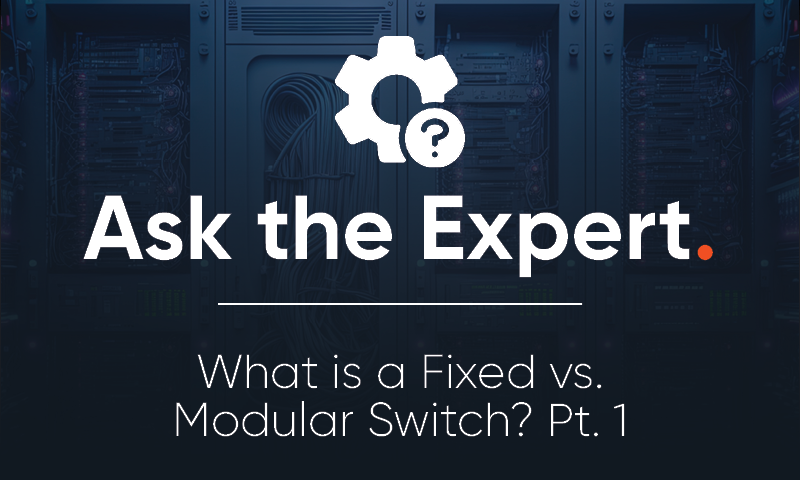Christine Austria and Curvature’s Networking Category Manager, Jesse Newton, discuss the question – What is the difference between a fixed switch and a modular switch? – in our series Ask the Expert.
Christine: Hey everyone, welcome to a new episode of “Ask the Expert”. I’m Christine Austria, and today we have Jesse Newton, Curvature’s Networking Category Manager to help us understand the differences between fixed and modular network switches. Thanks for joining us, Jesse!
Jesse: Thank you for having me! I’m excited to be here.
What is a Fixed Switch?
Christine: Yeah! So, let’s start with the basics. What is a fixed switch?
Jesse: A fixed switch is a network device that comes with a fixed configuration, meaning an unchangeable number of ports. These devices are designed by OEMs to meet the most common customer use cases in a network environment.
What is a Modular Switch?
Christine: And what about a modular switch?
Jesse: Well, modular switch is a bit of a broad category. Modular might mean a switch that has a slot in it that you can pop in different modules and give some different ports. Or, modular might mean a chassis-based switch that has lots of slots that you can put all sorts of different cards in. So that sort of modular device, really modularity means you can tailor the device to the capabilities and needs of whatever situation you’re trying to solve for in your network.
Christine: That’s great information. Can you give us an analogy to help understand the difference?
Jesse: Sure! A fixed switch might be like a simple toolbox that has a screwdriver and a hammer in it. Your basic tools that are going to get whatever basic job done you need, and when you buy it, it has the basic features. A modular switch might be a big toolbox that has lots of different trays and different options to give you the ability to solve many different challenges in your network.
Key Differences Between Fixed vs. Modular Switches
Christine: So, what are some key differences between a fixed and a modular switch?
Jesse: Well, a fixed switch is going to have a predetermined number of ports. These ports generally range between 8 and 48 ports on the front of the device, that will have standard speeds, and that’s what the switch is built for. It’s going to have simpler design, so there’s not going to be a lot of choices and options. It’s going to be easy to order, deploy and then manage, and there’s going to be limited scalability. So, whatever you order is going to be fixed for the life of the device, you won’t be able to change it much. A modular switch, on the other hand, is going to have, maybe, some different ports that you’re going to be able to upgrade in the future. Things like hot swap power supplies for redundancy, or different slots you can pop in to give more ports in the future if you need it. And these ports are going to give you increased capacity potentially or increased functions, things like the ability to add faster ports at some future time and those ports might also be new slots you add in a chassis, if you’re, let’s say, growing your network in your office, adding more people and things like that.
Christine: Sounds like there’s a lot of options. Thanks for sharing, Jesse. On our next episode, we’ll dive deeper into switching customization options. If you have any questions for our sales engineers on fixed and modular switches, simply leave a comment below or contact us today and we’ll see you next time on “Ask the Expert”.
To get more in-depth information on fixed and modular switches, click here to read our tech guide or contact us today!



